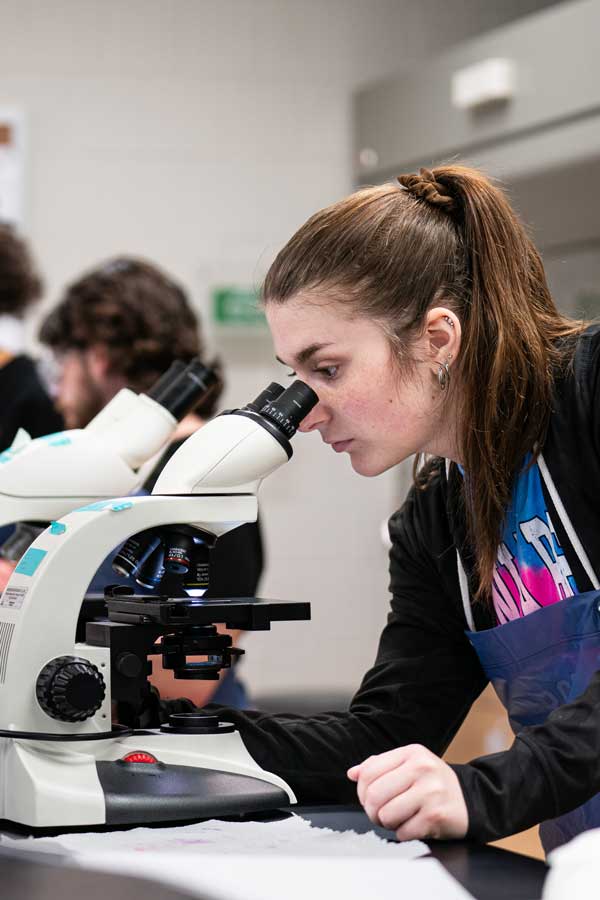
Biology - BS
If you want to do more than just live life, become a biologist and study it.
Why study biology at Pitt-Bradford?
You’ll be on a campus in a biologist’s paradise, where you’ll study a wide variety of living things in the nearby national forest, state park, mountains, creeks and other natural habitats.
You’ll get hands-on experience so you can apply what you learn in class. Work as an intern or shadow a physician or health care worker at a local hospital. Interact with local health and environmental agencies.
What will I learn?
As part of a close-knit biology department, you’ll work closely with your professors who will teach you about the full range of biological topics, from DNA and cells to whole animals and ecosystems. Your professors also will help you develop research skills so you can present research at local and national conferences.

What can I do with a degree in biology?
With all of these experiences, as well as the strong curriculum, you’ll be prepared for a career in the field, graduate school or medical school.
Our biology graduates have been admitted to medical, physical assistant, veterinary, optometry, dental, chiropractic and other health-related post-baccalaureate schools.
Job titles:
- Assistant radiographer
- Biological researcher
- Dietetic and nutrition technologist
- Laboratory technologist
- Medical scribe
- Pharmaceutical researcher
Graduate schools:
- University of Pittsburgh Medical Center
- West Virginia University School of Pharmacy
- Johns Hopkins University’s Bloomberg School of Public Health
- Lake Erie College of Osteopathic Medicine
- Rowan University School of Osteopathic Medicine
- Queens University
- University of Buffalo/Roswell Park Cancer Institute
- Drexel University College of Medicine
- Paris Descartes University
- Thomas Jefferson University College of Pharmacy
Success Stories
Kaylee McCracken ’24
Kaylee McCracken’s passion for the environment stems from her childhood. She grew up in New Jersey near the beach, where the residents of her community, pushed to protect the beaches.
Olubumi Braimah '22
Olubumi “Bumi” Braimah found himself far from his home, when he came to Pitt-Bradford. His experience mirrors that of many students who initially applied to the Pittsburgh campus but found a home and lasting connections at Pitt-Bradford.
Haley Ward '18
Haley Ward brought intelligence, resilience, and determination to her college career. She now channels that same focus and purpose into cancer research at Roswell Park.
-
BIOL 1440
Cancer BiologyDiscovering a cure for cancer has been one of the most difficult challenges for modern biomedical science. This class will discuss what causes cancer, what makes cancer cells different from normal cells, and what avenues for the future treatment of cancer look promising. The scientific process and a discussion of experimental techniques used in modern cancer research will be emphasized. -
BIOL 1306
NeurobiologyThe biology of nervous systems will be studied at various levels, including the cellular and molecular biology of neurons, sensory systems, motor control, and higher cortical functions in humans. All topics are viewed across phyla and from an evolutionary perspective. The course will emphasize scientific reading and oral communication of scientific material. Three hours of lecture and four hours of lab per week.
More to Know
Future doctors and other health professionals may streamline their acceptance into medical school via our Freshman Guarantee at the University of Pittsburgh Medical School. Future doctors, dentists, and optometrists may be able to secure an early seat by enrolling in our special programs with Lake Erie College of Osteopathic Medicine, Neumann University, Pitt's Dental School, or the Pennsylvania College of Optometry at Salus University.
Program-Related News

Enrollment up nearly 9%
Increased retention among reasons for gains.

New partnership announced with Northeast College
Agreement allows Pitt-Bradford students to earn Doctor of Chiropractic in three years.

Mintz’s successful career enables gift
Scholarship to benefit students in natural sciences.


